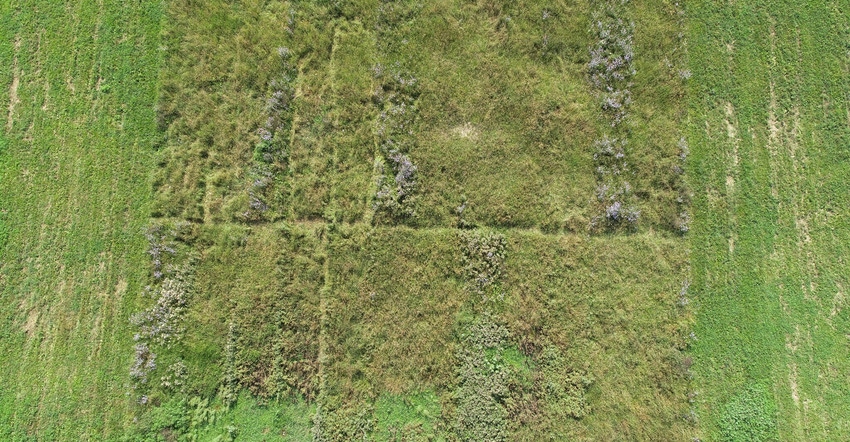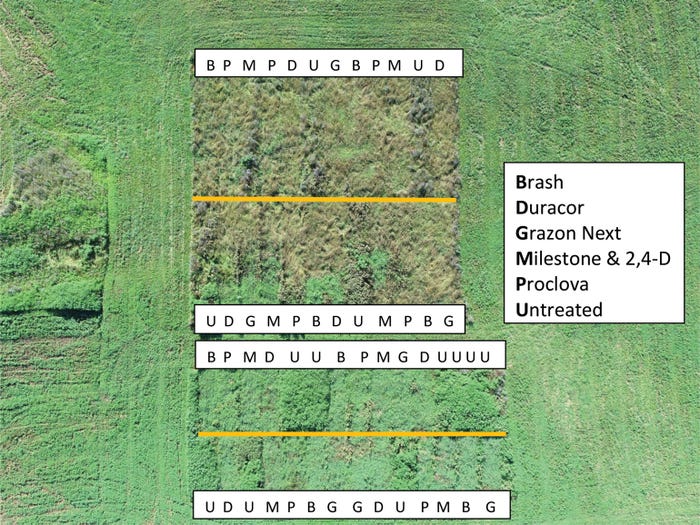
Real-time poll results of some 200 participants in a recent Purdue University virtual pasture field day indicate weeds are a big concern to many livestock people. Keith Johnson, Purdue University Extension forage specialist, says getting a handle on them begins with recognizing just how problematic weeds can be in pastures.
“They can reduce forage quality and affect livestock performance,” Johnson says. “Some weeds are also toxic for livestock. It just makes sense to get weeds under control and manage to keep them out of pastures.”
A solid, regular soil testing program followed up by fertilization where necessary is a good start toward weed control, Johnson says. “Some weeds come in if the pH gets too low or if certain nutrients are deficient,” he observes. “Soil testing and applying fertilizer as needed not only results in more growth, but also helps forages outcompete weeds.”
 PASTURE WEED STUDY: This drone image was taken midsummer during the Purdue weed control study. A list of herbicides applied is listed on the right. Letters on the various blocks represent the product applied in that pasture plot in the trial.
PASTURE WEED STUDY: This drone image was taken midsummer during the Purdue weed control study. A list of herbicides applied is listed on the right. Letters on the various blocks represent the product applied in that pasture plot in the trial.

However, there may still be times when chemical weed control is needed. Johnson was part of a pasture weed study at the Scholer Beef Farm in Warren County in 2020, which also involved Ron Lemenager of Purdue Animal Sciences, Scott Cronk from Scholer Beef Farm, John Scott, Digital Agriculture Specialist at Purdue, Stacie Songer with Corteva Agriscience and Bill Johnson and Marcelo Zimmer from the Purdue Botany Department. The study compared the performance of key pasture herbicides on common pasture weeds and looked at their impact on beneficial legumes.
Weed control options
“There aren’t as many options for herbicides in pastures but there are some effective choices for key weeds,” says Bill Johnson, Purdue weed control specialist. “The auxins are effective against summer annual broadleaf weeds if you spray before they go to seed, and they’re effective against Canada thistle if you spray by the bud stage.” The auxins include 2,4-D and dicamba.
Some tougher weeds like dogbane, milkweed or woody perennials may require herbicides containing triclopyr. Stinger can help on thistles.
“Staging is important in controlling pasture weeds, because if it��’s a perennial with rhizomes or a taproot, you may want to work on it in the fall, and you’re probably not going to wipe it out with one application,” Bill Johnson says. “It’s also critical to follow label directions.”
“Some of these products restrict grazing for a specified number of days before you can return animals after application. With some herbicides you can spray and leave animals in the field.”
Keith Johnson adds, “There are also differences on how long you must wait before seeding legumes after applications. Be sure you check labels.”
2020 Purdue Scholer trial
The team documented control of Canada thistle, curly dock, broadleaf plantain, common ragweed, cocklebur and ladysthumb with both photos and percentage control estimates. Several herbicides were tested, including Milestone, DuraCor, which was new in 2020, and ProClova, which isn’t yet registered, and is awaiting approval by the Environmental Protection Agency, Songer says.
All products except ProClova showed 80% to 85% control of Canada thistle after four weeks, and 95% control after six weeks, Zimmer says. ProClova, which works more slowly, was at 88% after six weeks. In fact, all the products were effective against the weeds tested, except ProClova didn’t control ladysthumb, Zimmer observes.
The bright spot for ProClova, however, is that it’s the only one that doesn’t kill white clover, Zimmer says. There is some initial damage with ProClova, but the clover rebounds. It could be a useful tool if you’re including legumes in pastures in the future, Keith Johnson concludes.
About the Author(s)
You May Also Like




